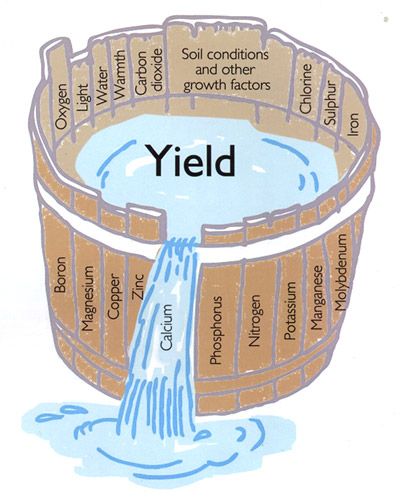|
A measurement of soil pH is not a measure of calcium, but rather the hydrogen ions within
the sample. Calcium is a vital element, which in adequate supply serves to boost microorganisms and earth worm activity in the soil, in addition to having a useful affect on soil pH. Calcium is further required for cell wall development and phosphate fixation, maximising the utilisation of applied manure and fertiliser. It improves soil aeration through rooting strength and grazed intake through sweeter, more palatable grass. Finely ground raw materials make for highly available calcium, an element in which most UK soils are found to be deficient.
The health and stimulation of soil life in the form of earthworms and micro-organisms is once
again coming into focus as a means to produce quality, sustainable foods whilst reducing
dependency on chemical inputs. There is a direct relationship between biological activity and
course in profitability. All lime has a role to play here and the well documented importance
of a comprehensive liming policy is a relevant as ever.
Balancing soil pH in harmony with cropping requirement is to assist in the encouragement of
good root development and improved top-soil structure. It is to increase the availability of
minerals and trace elements essential for plant growth and, ultimately, enterprise productivity
through increased plant health, quality and yield.
The addition of lime helps to release soil nutrients. Fertilisers and manure cannot be fully effective if the land is short of lime. In addition, water that leaches from acid soils may contain undesirable materials which can adversely effect the quality of surface and groundwaters.

"Leibig's Barrel”
Agricultural Lime increases the availability of major nutrients nitrogen, phosphate and potassium by:
- increasing nitrogen fixing in legumes and free living bacteria
- increasing N, P & K release from organic matter through higher microbial activity
- releasing phosphate from iron and aluminium
- decreasing potassium loss from leaching
Aglime increases availability of minor nutrients sulphur, calcium and magnesium by:
- increasing S, Ca and Mg release from organic matter through higher microbial activity
- decreasing calcium and magnesium loss by reducing leaching
- supplying calcium and magnesium
- Improved Root and Plant development
- Building and maintaining soil structure
- Neutralising acidification
- Reducing possibilities of soil erosion
- Inhibiting the movement and transposition of Heavy Metals
- Increasing Bacterial activity in the soil
- Supporting organic matter build up
- Maximising efficiency from fertilisers and agro-chemicals.
- Decreasing nutrient loss from leaching
- Releasing soil nutrient reserves
- Improved water quality in rivers and streams
- Development of environmental and woodland areas
- Improved environment for wildlife
|



